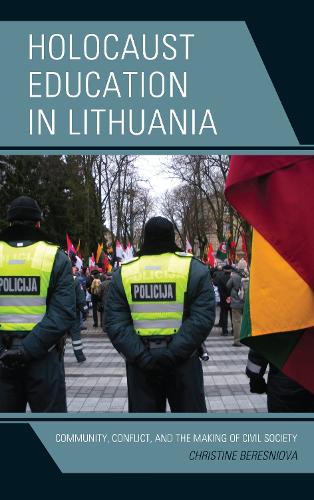
Holocaust Education in Lithuania: Community, Conflict, and the Making of Civil Society
(Hardback)
Publishing Details
Holocaust Education in Lithuania: Community, Conflict, and the Making of Civil Society
By (Author) Christine Beresniova
Bloomsbury Publishing PLC
Lexington Books
8th March 2017
United States
Classifications
Professional and Scholarly
Non Fiction
Modern warfare
The Holocaust
History of education
Social and cultural anthropology
940.5318071
Physical Properties
Hardback
218
Width 157mm, Height 240mm, Spine 20mm
454g
Description
Holocaust Education in Lithuania is based on a six-year, multi-sited ethnographic research project that was conducted to analyze the effects of the controversial policies of Holocaust education which were introduced as conditions of membership for access into post-Soviet western alliances. In order to understand how individuals take up transnational policies and programs intended to support democratization, Beresniova delves into rarely discussed issues. She looks at the means through which inherent cultural and political assumptions have had an impact on the ways in which memory and history are used in educational programs. She also scrutinizes the motivating factors for involvement in Holocaust education, such as the importance of community building, civic activism beyond the topic of the Holocaust, and the perceived power of the international community in dictating domestic education policy guidelines. Beresniova contends that educators must acknowledge the political and cultural elements in Holocaust education programs and policies, or risk undermining their own efforts. This book is recommended for scholars of anthropology, education, history, political science, and European studies.
Reviews
The book analyzes not only the motivation of teachers working with Holocaust programs, but also many other contexts which influence the success or failure of these programs. . . . Beresniovas book can serve the interests of other researchers who analyze similar problems in other countries. The book will be truly useful to everyone working in the field of education who is able to critically reflect on their activities. * Slavic Review *
In Holocaust Education in Lithuania: Community, Conflict, and the Making of Civil Society, Beresniova deftly uncovers the contested divergence of memory and history while cogently attending to transnational epistemological entrepreneurship. Informed by rich theoretical depth, Beresniovas position provides a unique and insightful perspective into a complex site of multiple and overlapping cultural, ethnic, political, and historical legacies. With an ultimate focus on the transformative role of teacher agency and the importance of community for opening controversial and closed areas, Beresniovas work provides generative pathways for understanding how educational innovations can help bring about more just societies. -- Thomas Misco, Miami University
This book provides a fascinating account of one of the most important conversations to be had in today's democratic Lithuania: how to deal with the history and legacy of mass atrocities and local collaboration during the Holocaust. By focusing on Holocaust education in a context of ongoing research into the actual historical events and fierce public battles over how to remember both Stalinist and Nazi crimes, Beresniova manages to combine scrutiny of memory politics (not least of all the US) and a scrupulous interrogation of local education practices with much empathy for diverse positions and concerns on the ground. This is a must-read for anyone interested in contemporary Lithuania and in national and transnational politics of history and memory. -- Eva-Clarita Pettai, University of Tartu
Christine Beresniova provides deep insight into the cultural struggles over history and memory that are occurring within and between European states in this beautifully written and sensitively rendered study. Beresniova explores the shifting meanings of the Holocaust in Lithuania as educators navigate the local and international politics surrounding memory. This sympathetic but critical analysis captures local perspectives and, crucially, shows how foreigner advocates often fail to understand local history, culture and language, which undermines dialogue and progress for all involved. The vivid vignettes effectively illuminate the broader policy and cultural currents, providing readers an understanding of the interaction between global and local dynamics. This volume will be of high interest to any reader of European politics, memory and education. -- Doyle Stevick, University of South Carolina
Association for the Advancement of Baltic Studies Honorable Mention for the 2018 AABS Book Prize: [An] original, comprehensive and significant contribution to the analysis and evaluation of Holocaust education in Lithuania, based on extensive fieldwork and building on earlier publications. The issue of Holocaust education is of central importance to Lithuanias integration in Europe in terms of political, cultural and educational matters.
Author Bio
Christine Beresniova is program coordinator at the United States Holocaust Memorial Museum and educational consultant on policy and culture.
